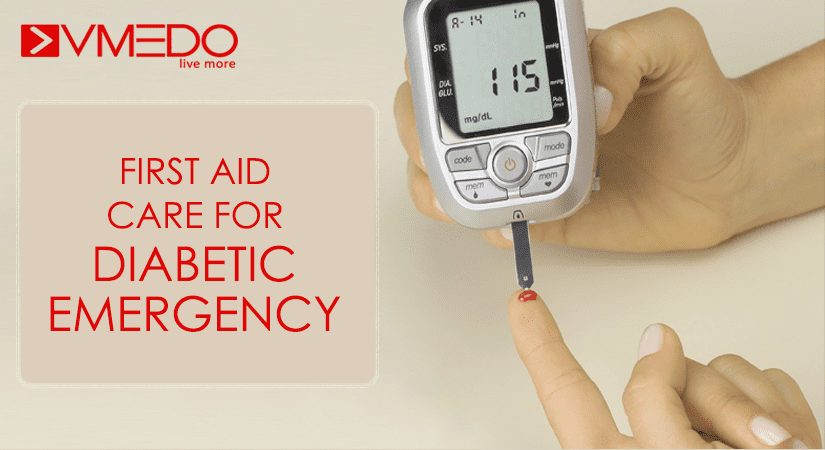Most patients manage their diabetes with a balanced diet and/or self-administered insulin. But there are some conditions, where a patient needs urgent first aid.
1. If the patient is unconscious, call Emergency medical services immediately. And never try to give anything to eat or drink if he is unconscious.
2. While waiting for help, check their breathing, pulse, and level of consciousness. If the victim is unconscious, place the patient horizontally on the flat surface, open their airway &administer CPR.
3. If, the patient is fully conscious, give some sugar, sweetened drink or chocolate or glucose or any prescribed medication which gives improvement within few minutes.
4. While waiting for help, reassure the patient because he may be confused until fully recovered.
5. While waiting for help don’t try to give the patient a dose of insulin without testing the patient’s blood sugar level.
6. Continue giving sugar or sweetened drink, every 15 minutes until the patient fully recovers.
Causes of Diabetes:
The cause of diabetes does not know yet. But few known risk factors include:
1. Type 1 diabetes: Type 1 diabetes is caused when immune system attacks & destroys the insulin-producing cells in the pancreas. The main causes include genetics, environmental factors and potentially even viral or bacterial infection.
2. Type 2 diabetes: This is the most common type of diabetes and the risk factors are multi-factorial that include genetics (parenting or sibling with diabetes), increasing age, and lifestyle factors with bad diet, high blood pressure, lack of physical inactivity, overweight, ethnicity, obesity and a lethargic lifestyle.
3. Gestational diabetes: This affects females during pregnancy & the diagnosis of this type is made during pregnancy. The main cause of Gestational diabetes is unknown and the risk factors include the family history of diabetes, overweight, hormonal changes and large baby weight (weighing more than 9 pounds).
Signs &Symptoms of Diabetes:
Common symptoms include:
1. Hunger & Fatigue.
2. Being thirstier &frequent urination.
3. Itchy skin & dry mouth.
4. Blurred vision.
5. Unusual weight loss.
6. Skin infections that do not heal for a longer duration
7. Numbness in feet & hands.
8. Slow healing of cuts & bruises.
9. Nausea & vomiting.
10. Abdominal pain.
Important: For gestational diabetes, there are no symptoms. So it is very important to be tested during pregnancy at the proper time.
Prevention:
Best way to prevent diabetes is changing your lifestyle & it’s not too late to start. But many of the times type 1 diabetes can’t be prevented.
Few factors that help us to prevent diabetes include:
1. Be physically active: participate in everyday exercise for at least 30-45 minutes which helps to maintain proper weight and fitness. (Regular physical activity).
2. Balanced &Healthy diet: enjoy a variety of healthy food including fruit, vegetables, fiber, reduced fat products and wholegrain and cereals.
3. Limit red meat.
4. Skip the sugary drinks & limit alcohol intake.
5. Quit smoking.
6. Control your blood pressure &cardio-vascular diseases.
Frequently Asking Questions about Diabetes:
1. What is Diabetes?
Diabetes is also referred as diabetes mellitus, is a lifelong condition where the person has high blood glucose (blood sugar) level than normal, and pancreas cannot produce enough insulin to make use of glucose or the body cannot respond properly to insulin or it might be both.
2. What is the role of Insulin in your body?
Insulin is a hormone made by the pancreas (organ to control sugar levels) helps your body to use glucose (sugar) from carbohydrates in the food. It helps in the regulation of blood glucose levels.
Lack of insulin results in symptoms of diabetes.
3. What are the types of diabetes?
Type 1 diabetes: Type 1 diabetes is caused when immune system attacks & destroys the insulin-producing cells in the pancreas. As a result little or no insulin is released into the body which results in sugar level builds up in the blood instead of being used as energy. Patients with type 1 diabetes have to take insulin injection for the rest of their lives.
Type 2 diabetes: This occurs when the body properly can’t use insulin or does not make enough insulin. As a result, sugar level increases in the blood instead of being used as energy. About 90 percent of people with diabetes have type 2 diabetes.
Type 2 diabetes is managed depending on the severity. It is managed with the help of physical activity, meal planning, and medications that help to control blood sugar more effectively.
Gestational diabetes: This affects females during pregnancy & the diagnosis of this type is made during pregnancy. It affects almost two to four percent of women during their pregnancy and an increased risk of developing diabetes for both mother and child.
4. Is diabetes serious? Or what are the complications of diabetes?
Diabetes is a very serious disease that should be well managed. Serious complications of severe diabetes include damages to kidneys, eyes, nerves, heart, gums and teeth.
1. People with diabetes are more likely to develop heart & stroke problems.
2. Diabetes causes diabetic retinopathy which may cause blindness.
3. Diabetes is the leading cause of kidney failure.
5. How to Cure Diabetes??
There is no cure for diabetes. But few simple things can make a big difference in controlling diabetes.
Type 1 diabetes cure: Type 1 diabetes people must use insulin. There are some medications which are advised by Health professionals that include insulin-producing cells that can work without affecting the immune system.
Type 2 diabetes cure: The best way to cure type 2 diabetes is watch over blood sugar level & setting up goals with the help of Doctor, with the help of medications, exercise & balanced diet. Medications with insulin, non-insulin & therapies like insulin therapy, bariatric surgery helps in managing diabetes.
Also Read: 6 critical skills you should have when giving first aid for the heart attack

